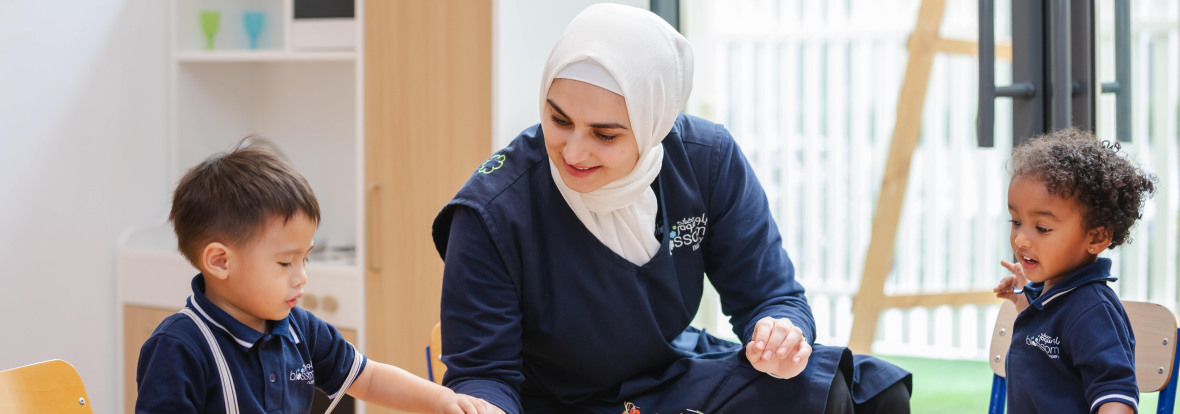Educational games for toddlers are more than just a fun way to pass the time—they are crucial tools for development. These games can boost cognitive abilities, foster social skills, and lay the groundwork for academic success. But with countless options available, how do you choose the right game for your little one? At The Blossom Nursery, our goal is to foster learning through fun, and we bring you a comprehensive guide for parents looking for ways to keep their children entertained during their free time.
Types of Educational Games for Toddlers
These games play a crucial role in early childhood development by promoting cognitive, motor, and social skills. From puzzles and memory games to interactive play and outdoor activities, each type of game offers unique benefits that can enhance your child's learning experience in a fun and engaging way.
Physical Games for Hands-On Learning
Physical educational games offer invaluable benefits by encouraging hands-on interaction, which is essential for developing motor skills and spatial awareness. These games can include puzzles, building blocks, and sorting activities that engage toddlers in active learning. The key is to choose games that align with your toddler's interests and promote their development in a fun and interactive way.
-
Interactive Play: Combining Learning with Fun
Interactive play, whether through toys or games, is an excellent way to make learning engaging. Games that involve actions like sorting, matching, and building not only captivate toddlers but also help reinforce key concepts.
Cognitive Development Through Games
-
Puzzle Games for Critical Thinking
Puzzle games are fantastic for developing critical thinking and problem-solving skills. They encourage toddlers to think logically and recognize patterns, essential abilities that will benefit them in later academic pursuits.
-
Memory Games for Retention Skills
Memory games, such as matching pairs or sequence repetition, enhance toddlers' memory recall ability. These games also support attention to detail and concentration.
Language Skills Development
-
Alphabet Games for Early Literacy
Alphabet games introduce toddlers to letters and sounds in a playful context. These games often use visual aids and repetition to help toddlers recognize and remember the sound of the alphabets, paving the way for reading and writing skills.
-
Storytelling and Role-Playing Games
Storytelling games stimulate imagination and language use, encouraging toddlers to express themselves verbally. Role-playing games further enhance this by allowing children to act out scenarios, expanding their vocabulary and comprehension.
Mathematical Skills for Preschoolers
-
Counting Games for Number Recognition
Counting games help toddlers understand numbers and their order. Simple activities, like counting objects or playing number-based games, build a solid foundation for future math skills.
-
Shapes and Patterns: The Foundation of Geometry
Recognizing shapes and patterns is crucial for early geometry skills. Games that involve sorting shapes or identifying patterns help toddlers understand spatial relationships and sequencing.
Social Skills and Emotional Growth
-
Cooperative Games for Sharing and Teamwork
Cooperative games teach toddlers the value of sharing, turn-taking, and teamwork. These games promote social interaction and help toddlers understand the importance of working together towards a common goal.
-
Emotion Recognition Games
Games that focus on identifying and expressing emotions can help toddlers develop emotional intelligence. These games teach children to recognize their feelings and understand those of others, fostering empathy and social awareness.
Motor Skills Enhancement
-
Fine Motor Skill Games
Activities like threading beads or assembling small puzzles improve fine motor skills by requiring precise hand movements. These games are essential for developing hand-eye coordination and dexterity.
-
Gross Motor Skill Activities
Games that involve running, jumping, or climbing enhance gross motor skills, promoting overall physical development and coordination. Outdoor activities, in particular, provide ample opportunities for toddlers to develop these skills.
Top Educational Games for 3-Year-Olds
-
Classic Board Games with Educational Twists
Board games like "Candy Land" or "Chutes and Ladders" can be adapted to include educational elements, such as counting or color recognition. These games are not only fun but also provide a structured learning experience.
-
Active and Hands-On Learning Games
Active games that encourage physical movement and interaction can be highly beneficial for young children. Games like "Simon Says," "Duck Duck Goose," and treasure hunts promote cognitive skills, coordination, and social interaction. Incorporating educational twists, such as following specific instructions or identifying shapes and colors, can enhance their learning experience.
DIY Educational Games
-
Crafting Learning Tools at Home
Creating DIY educational games can be a rewarding experience for both parents and toddlers. Simple materials like cardboard, markers, and paper can be transformed into games that teach numbers, letters, or shapes.
-
Outdoor Games for Physical Activity
Outdoor games, such as scavenger hunts or obstacle courses, combine physical exercise with learning. These activities encourage exploration and can be tailored to focus on specific educational goals.
Integrating Educational Games into Daily Routine
-
Setting Up a Learning Schedule
Incorporating educational games into a daily routine can provide structure and consistency. Designate specific times for different types of games, ensuring a balanced approach to various skills and activities.
-
Balancing Different Types of Activities
Creating a balanced routine that includes physical play, creative activities, and interactive learning games is important for well-rounded development. Activities like outdoor play, arts and crafts, and hands-on educational games help develop physical, cognitive, and social skills. Ensuring a diverse range of activities supports comprehensive growth and keeps your toddler engaged and motivated.
The Role of Parents in Educational Play
-
Engaging with Your Child During Playtime
Parents play a crucial role in enhancing the educational value of games. Engaging with your child, asking questions, and providing guidance can enrich the learning experience.
-
Encouraging Independent Play
While parental involvement is important, encouraging independent play is equally crucial. It fosters creativity, problem-solving, and a sense of autonomy in toddlers.
Safety Tips for Educational Gaming
-
Age-Appropriate Games
Ensure that the games you choose are appropriate for your child's age and development level. This maximizes the educational benefit and ensures a safe and enjoyable experience.
Monitoring Screen Time and Online Safety
At Babilou, we adhere to strict screen guidelines to ensure the healthy development of our children. For ages 3-6, we recommend no more than one hour of screen time per day, always shared with an adult to foster engagement. Screens should be used as tools for interaction, similar to books, and it's advisable that children identify one device they can use, rather than having unrestricted access to multiple devices. We discourage online games for young children, advocating for board games instead.
Our four golden rules of screen engagement include:
- No screens in bedrooms
- No screens in the morning before school
- No screens during meals
- No screens before bedtime.
For children under three, we promote an "Early Years without Screen" policy. No screens should be used for children under two, and minimal screen time (ideally 30 minutes a day) is advised for ages 2-3, always in the presence of an adult.
Screen time should be supervised, recognizing that less screen time is better due to its association with sedentary behavior. Young children are sensorial learners who need movement and active learning experiences. These guidelines ensure that screen time is used effectively and safely, supporting the overall well-being and development of our children.
Educational games are a vital component of toddler development, providing more than just entertainment—they serve as building blocks for cognitive, social, and emotional growth. At The Blossom Nursery, we understand the importance of integrating fun with learning to nurture well-rounded, curious, and capable young minds.
Whether choosing between digital or physical games, parents can find a wealth of options that cater to different aspects of their child's development. By engaging with their children during play and encouraging a balance between guided and independent activities, parents can significantly enhance the educational value of playtime. Remember, the goal is to create a playful learning environment that supports your child’s growth in every dimension, ensuring a strong foundation for their future academic and personal success.






